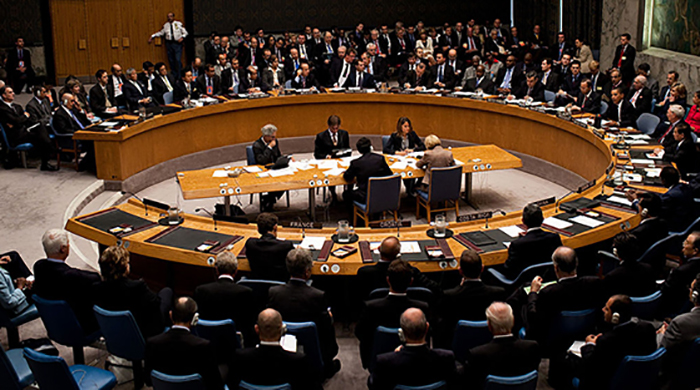The United Nations Security Council has adopted new resolutions against North Korea in response to the regime’s fifth nuclear weapons test that took place on Sept. 9.
The 15-member U.N. Security Council passed Resolution 2321 at the U.N. headquarters in New York on Nov. 30. The new measures describe the North’s fifth nuclear test as “a clear violation and ignorance of the U.N. Security Council Resolutions,” condemning the provocation with the toughest language possible. The resolution affirms that any additional nuclear weapons tests or missile launches will be met with grave consequences.
The new Resolution 2321 imposes tougher measures that make up for loopholes in the previous Resolution 2270, measures that could deal a substantive blow to the North’s economy.

The core of the new resolution is to impose a “limit on how much coal, its main source of income, the North can export per year.”
Starting on Jan. 1, 2017, total exports of coal from the regime to the U.N. Security Council member states should not exceed 7.5 million metric tons annually, worth about USD 400.8 million, equivalent to KRW 472 billion. This amounts to 38 percent of the North’s gross earnings from coal exports last year. The limit is expected to reduce the regime’s annual foreign currency revenues by USD 700 to 800 million, or KRW 819.7 to 936.8 billion.
The resolution also blocks North Korean exports of silver, copper, nickel and zinc, as well as coal, iron, iron ore, gold, vanadium ore and rare earth resources. Large sculptures from the North, too, are banned from being exported, while U.N. member states are restricted from selling helicopters or ships to the North.
The resolution also contains additional measures aimed to further restrict the North’s diplomatic activities. U.N. member states should reduce the number of officials working at diplomatic missions in the regime. On top of that, there’s a limit on the number of bank accounts -- one per North Korean diplomatic mission and one per diplomat -- so as to easily detect any illicit money-laundering activities.
The sanctions also prohibit North Korean officials who engage in the development of weapons of mass destruction (WMD), from entering any U.N. member state, as well as from making profits through the ownership of property.
The resolution contains strengthened restrictions that ban financial organizations in U.N. member states from doing business in the North, and they must also close any existing offices or bank accounts in the North within 90 days. Both public and private financial aid related to trade with North Korea will be banned, as well.
Finally, the new resolution names 11 North Korean officials, including North Korean Ambassador in Egypt Park Chun-il, and 10 entities, including the Unification Development Bank, on a blacklist for travel bans and asset freezes.
By Sohn JiAe
Korea.net Staff Writer
Photo: U.N. Security Council
jiae5853@korea.kr
The 15-member U.N. Security Council passed Resolution 2321 at the U.N. headquarters in New York on Nov. 30. The new measures describe the North’s fifth nuclear test as “a clear violation and ignorance of the U.N. Security Council Resolutions,” condemning the provocation with the toughest language possible. The resolution affirms that any additional nuclear weapons tests or missile launches will be met with grave consequences.
The new Resolution 2321 imposes tougher measures that make up for loopholes in the previous Resolution 2270, measures that could deal a substantive blow to the North’s economy.

The U.N. Security Council unanimously adopts the new Resolution 2321, tougher than the pre-existing Resolution 2270, against North Korea, in New York on Nov. 30.
The core of the new resolution is to impose a “limit on how much coal, its main source of income, the North can export per year.”
Starting on Jan. 1, 2017, total exports of coal from the regime to the U.N. Security Council member states should not exceed 7.5 million metric tons annually, worth about USD 400.8 million, equivalent to KRW 472 billion. This amounts to 38 percent of the North’s gross earnings from coal exports last year. The limit is expected to reduce the regime’s annual foreign currency revenues by USD 700 to 800 million, or KRW 819.7 to 936.8 billion.
The resolution also blocks North Korean exports of silver, copper, nickel and zinc, as well as coal, iron, iron ore, gold, vanadium ore and rare earth resources. Large sculptures from the North, too, are banned from being exported, while U.N. member states are restricted from selling helicopters or ships to the North.
The resolution also contains additional measures aimed to further restrict the North’s diplomatic activities. U.N. member states should reduce the number of officials working at diplomatic missions in the regime. On top of that, there’s a limit on the number of bank accounts -- one per North Korean diplomatic mission and one per diplomat -- so as to easily detect any illicit money-laundering activities.
The sanctions also prohibit North Korean officials who engage in the development of weapons of mass destruction (WMD), from entering any U.N. member state, as well as from making profits through the ownership of property.
The resolution contains strengthened restrictions that ban financial organizations in U.N. member states from doing business in the North, and they must also close any existing offices or bank accounts in the North within 90 days. Both public and private financial aid related to trade with North Korea will be banned, as well.
Finally, the new resolution names 11 North Korean officials, including North Korean Ambassador in Egypt Park Chun-il, and 10 entities, including the Unification Development Bank, on a blacklist for travel bans and asset freezes.
By Sohn JiAe
Korea.net Staff Writer
Photo: U.N. Security Council
jiae5853@korea.kr